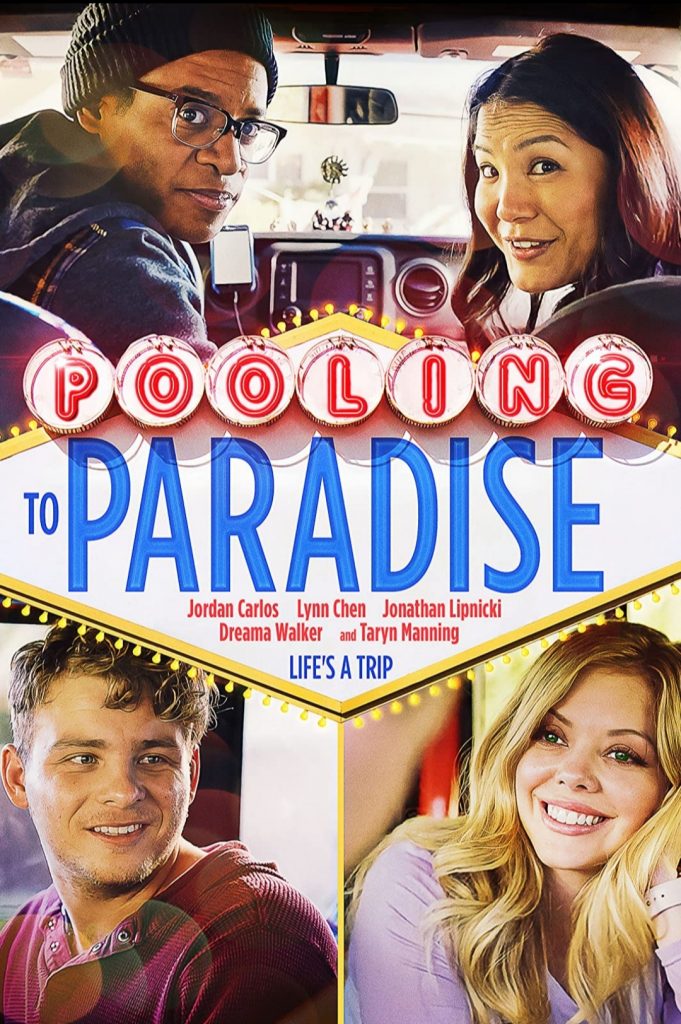Lucidno
Pooling to Paradise
(2021, Directed by Roxy Shih)

There are many entries into festivals that have otherwise gone unnoticed because of the more word of mouth publicized films, or the sheer scale of a festival program. In the smaller independent film festivals, the continuous effort is to push the boundaries of the accepted norm and of the never-ending struggle to evolve the medium means that other films have a greater chance of recognition. Indie director Roxy Shih’s latest comedy-drama Pooling to Paradise (2021) is such a contender. An engaging ‘Road Flick’ that is an often fun critique on contemporary living; it follows a disparately assembled group of directionless L.A. types taking a road-trip that involuntarily leads to Nevada.
Watching a road movie is often a compelling metaphor of a journey that becomes more self-reflection than destination. Pooling to Paradise reaffirms this and is often fun, even if at times the scenario is a little predictable. Ultimately, the journey is the narrative and the destination is the denouement. The central character is Jenny (Lynn Chen), a tired and struggling married mum and step-mother who plans to travel to Las Vegas for a professional Blogger conference. However, things start going wrong before she’s even left. She accidentally selected the ‘Carpool’ option on her app instead of a Taxi, and will discover she’s going to be sharing the ride with strangers and will also miss her scheduled flight. Joining her in the car are fellow passengers Kara (Dreama Walker), a soon-to-be-washed-up actress in a pink sweat suit; the hung-over and heartbroken Sean (Jonathan Lipnicki); and the older careless driver, Marc (Jordan Carlos).
As the journey begins and the individual stories unfold, Sean yearns for his ex-girlfriend, Dawn (Taryn Manning) in (the ironically named) Paradise, Nevada, and with Jenny now resigned to missing her flight, their driver Marc takes little convincing in making the full five-hour trip that afternoon. Such an inclined space inevitably consumes the viewer’s attention. It’s also interesting to see how characters play off one another. Here are four strangers at different stages in their lives: We learn that Jenny is a highly-strung mother, the younger Kara is a struggling and deluded actor, and the even younger Sean wants to kill himself after breaking up with his girlfriend. Meanwhile, driver Marc is a casualty of activist parents who now drifts and drives through life with the help of numerous narcotics.
 During the trip, as they open up and get to know each other better, at one point Sean pulls out a gun but reassures everyone it’s only to kill himself, despite the gun not being loaded. Kara tries to convince anyone who’s listening that she’s on her way to stardom. Meanwhile, Jenny constantly talks domesticity like everyone would somehow be interested. Marc, having undoubtedly been in this situation before, goes with the flow, but he is also revealed as something of a hopeless philosopher. This becomes amusingly evident when he recites quotes from The Matrix films as spiritual advice and then talks about existentialism like an impressionable teenager. Also, his insistence that he is somehow straight-edged is at odds with the fact that he has substances in his pocket.
During the trip, as they open up and get to know each other better, at one point Sean pulls out a gun but reassures everyone it’s only to kill himself, despite the gun not being loaded. Kara tries to convince anyone who’s listening that she’s on her way to stardom. Meanwhile, Jenny constantly talks domesticity like everyone would somehow be interested. Marc, having undoubtedly been in this situation before, goes with the flow, but he is also revealed as something of a hopeless philosopher. This becomes amusingly evident when he recites quotes from The Matrix films as spiritual advice and then talks about existentialism like an impressionable teenager. Also, his insistence that he is somehow straight-edged is at odds with the fact that he has substances in his pocket.
An increasingly distraught Sean offers to pay Marc extra to divert the journey and take him to Dawn’s home in Paradise, Nevada. With Paradise being near Vegas, and that she’s already missed her flight anyway, Jenny agrees to Sean’s plan. Kara, with nothing better to do, also agrees to this to help Sean. On the way, the shots of the desert landscape engulfing them is beautifully captured by cinematographer Jih-E Ping, forming a parallel with the directionless aims of the travelers on the road, and a departure from the predominant setting inside the car. This aside, a film like Pooling to Paradise still needs to deliver on the quality of its script. Fortunately this aspect improves as the film progresses, ensuing that the hit and miss humor of much of the first half of the film develops into a more engaging character drama where the characters have more depth and therefore more authenticity. Although an Indie Flick, it certainly has an appeal that would also cater for a more widespread audience and it will be interesting to see how it performs in the online and DVD markets.
Pooling to Paradise succeeds in elevating the level of both humor and drama and the satisfaction comes from getting to know these characters better. It is also unique in being the first known film to set a story using the modern and conscientious travelling option of Carpooling. Credit goes to writer Caytha Jentis (also the producer) and a script that extends beyond the obligatory jokes and observations, displaying good pacing and sympathetic characterization, while the dialogue ends up feeling less scripted as the film progresses. What at first seemed like a group of caricatures are characters ultimately molded into shape by their environment, all seeking a direction in their present lives. This gives more plausibility to the characters and helps us to form an allegiance to them.
The film was released in early August 2021 and has been selected for festivals, with Caytha Jentis chosen as the winner of the January Award for Best Screenplay at the Beyond the Curve International Film Festival. Pooling to Paradise was also awarded Best Film at the
Fort Myers Film Festival and has played as a finalist at the L.A. Independent Women Film Awards and also the Swedish International Film Festival.
Steven Yates

